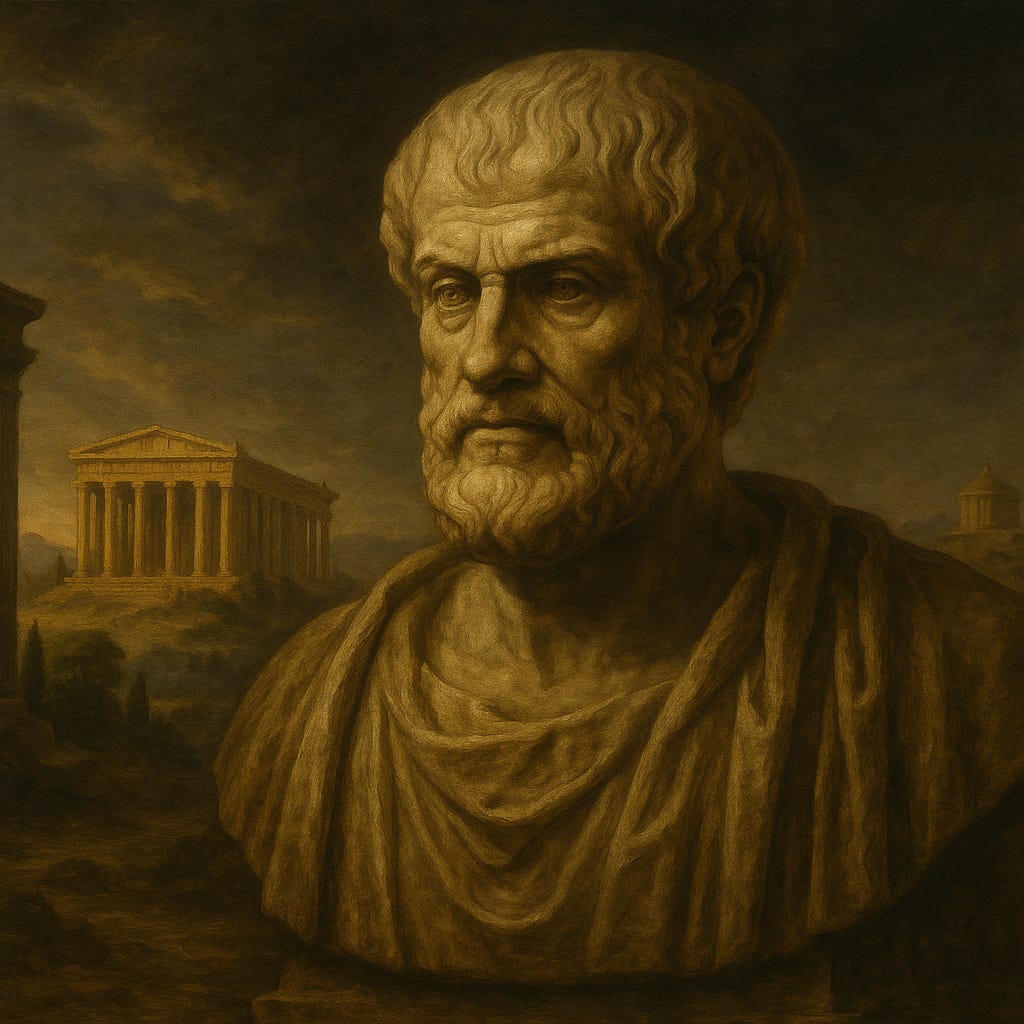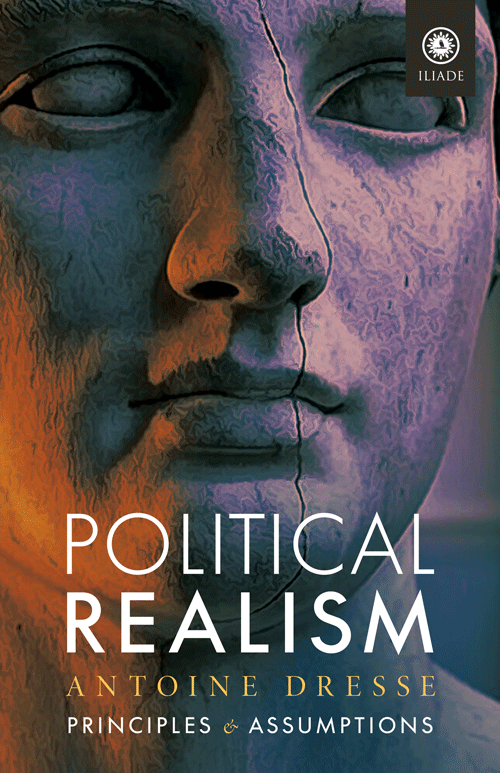Aristotle and the Community of Property
Antoine Dresse (“Ego Non”) revisits Aristotle’s critique of Plato’s idea of communal property, warning against the seductive yet perilous dream of a perfectly unified society.
The greatest temptation for a political thinker is to imagine a society purged of all dissension — a society in which every conflict has been resolved ex abrupto by the regime of his dreams. Such a temptation is, of course, understandable: a society can only endure insofar as it constitutes a political unity and is not corroded from within by chaos. “Civil war is the greatest of evils,” Pascal acknowledged.
Nevertheless, any philosopher or theorist must begin by questioning the nature of this political unity if they wish to avoid offering their country a dangerous dream — bearing in mind, of course, that dreams primarily affect those who are not dreaming, and that they risk being engulfed by the dream’s arbitrary grasp.
Now, if there is one philosopher we should read to set ourselves on the right path, it is Aristotle, particularly for his well-known critique of Plato’s “communism.” Whether Plato was truly a forerunner of “socialist systems,” as Vilfredo Pareto believed, is not the concern of these pages. What matters is that Aristotle took seriously Socrates’ proposal in the Republic — that the just City would establish a community of women and property — and that he offered a thorough response in the opening chapters of Book II of the Politics. This response deserves to be read attentively today, to avoid slipping into the delusions of egalitarian socialism.
The goal of Socrates, says Aristotle — and, by extension, the goal of many theorists, ancient and modern — is for the city to be as unified as possible. Thus, to make the members of the social body stand together in solidarity, it would seem necessary to abolish the primary cause of human tensions and rivalries: private property. “Among friends, all things are common,” said the Pythagoreans — and so it should be among the citizens of the same city.
Far from being a new idea, this communist utopia, already mocked by Aristophanes in The Assemblywomen, found in Aristotle a serious critic. If the city pushes too far toward unity, he observes, it will cease to be one at all, “for a city is by nature a certain kind of plurality”; you cannot introduce perfect unity without destroying it. The city must be one, but composed of diverse elements. The alloy is subtle and cannot be handled with a one-sided solution. No, the city is not a mere anarchic association of individuals from diverse ethno-cultural backgrounds — “the absence of ethnic community” being, in fact, the primary cause of sedition and civil war (Politics, Book V, 3) — but neither is it a monolithic block, a military barracks in which every citizen is an identical foot soldier.
If men live in community, it is because that community exists for the sake of a certain good, says Aristotle. And the good of a thing is what ensures its preservation. If, therefore, the total unification of the city — through the equalization of all — leads to its ruin, it cannot be considered a good. A city thrives by integrating its components while allowing for their progressive differentiation. The unity of the political body must accommodate internal multiplicity in order to survive.
An individual is, by definition, one — and cannot live independently of society. A family is also one, in a sense, but it is already a more relative unity, as its members differ from one another in their roles (father, mother, son, brother, sister, etc.). The family is thus less unified than the individual, but this internal multiplicity also makes it more self-sufficient. And a city is even less unified than a family, as its members differ even more greatly in their social functions, but this diversity makes the city even more self-sufficient. “If, then, greater self-sufficiency is preferable, weaker unity is preferable to stronger.” The city must be one — but not completely — because if it moves too far toward unity, it will become a degraded city, “like a musical harmony reduced to a single note.”
However, if total unity is not desirable, might not the community of property still bring some benefit to the city? After all, if it at least puts an end to internal social conflict, that would be no small gain. Aristotle’s response is very practical: “People take very little care of what belongs to a great number of people; indeed, individuals take the greatest care of what is their own and only a little of what is common — or only insofar as each is concerned with it. Moreover, common property is neglected more readily because people assume someone else is taking care of it, as happens in domestic work, where servants often perform worse when they are numerous than when they are few.”
Naturally, this argument will hardly satisfy revolutionaries and deconstructionists of all kinds, since it assumes that the sentiments and instincts we see in people today would still exist under an egalitarian regime. And it is true that the partisans of such regimes generally propose a complete re-education plan precisely in order to change this reality. But, as Vilfredo Pareto points out, “If one assumes that education can completely change the nature and character of men, then imagination may run free, and any social organization becomes possible.”
Yet, we have now waited many centuries for the experimental proof of these miraculous effects of education. What would stop stronger individuals from trying to appropriate others’ goods and overturn the system, just because nothing is privately owned? “The slightest observation is enough to see that man is drawn to desire precisely what he does not have,” Pareto continues. “The naivety of reformers and admirers of the ethical state is astounding; they imagine that issuing a law is enough to ensure its observance. If they studied history, they would see that force has always had the last word, and that those who had the power and the will to seize the State have never been stopped by any law.”
Aristotle’s fundamental premise is indeed this: the political art does not create men — it receives them from nature. And communist theories ignore the nature of man. Yet, as Aristotle notes, it suffices to observe men without prejudice to see that the utopia of common property collapses over the most trivial matters. Even people traveling together struggle to temporarily share their belongings, he reminds us: “most of their disputes typically revolve around trivial matters, and they quarrel over trifles.” Is it not futile, then, to attempt such an experiment on the scale of an entire city? And if such human vices exist, the blame lies not with the absence of shared property, but rather with human depravity — something we must reckon with.
Still, while selfishness and the abuses of private property may rightly be condemned, this should not lead us to dismiss “the importance of being able to consider something as one’s own,” which is a true source of joy, says Aristotle. “For there are two main things that move men to care and love: what one possesses personally, and what one holds dear.” Yet neither of these exists under an egalitarian regime, he adds, despite its cheerful appearance that “seems to express love for humanity.” Is it not a joy to help and care for one’s friends, guests, and companions, he asks? But this is only possible if one owns personal property. Private ownership may give rise to vices such as avarice, but it is also the source of noble virtues, like temperance and generosity — virtues essential not just to living, but to living well, which is the true aim of human society.
The ideal is thus not to be found in the complete sharing of all possessions, but rather in a measured and virtuous use of property. The best solution, writes Aristotle, “is for the ownership of property to be private, while its use is made common.” As for how to bring people to act accordingly, “this is the task of the legislator.” Indeed, through good laws, the legislator can become the artisan of ethical dispositions in citizens. He cannot change the order of things — still less the nature of man — but he can enact good laws, encourage good habits, which are the foundation of virtue, and of a good and happy life.
Originally published in Éléments no. 199, November 2022
Translated by Alexander Raynor







Ah private property is not the problem, it is private profit from land and other gifts of nature. Note your Tolstoy on this and his admiration of Henry George - shift taxes off labor and onto land value see theIU.org or contact me alannahartzok@gmail.com
Rispetto dell proprietà privata è indispensabile per una società libera e democratica.